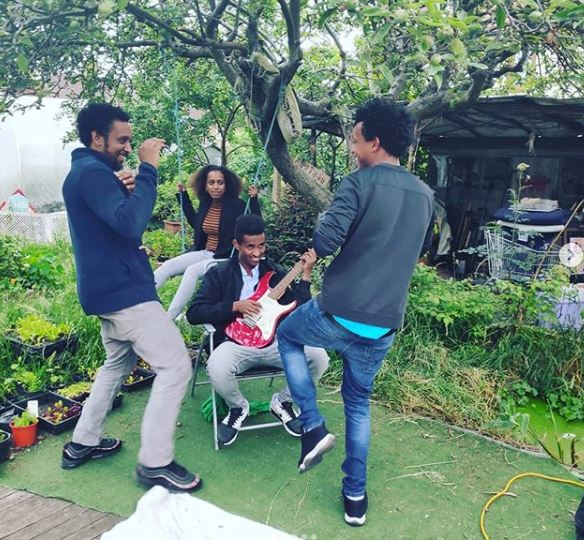Tucked away at the end of a cul-de-sac behind an ordinary semi-detached house in south London, it’s easy to miss the entrance to May Project Gardens.
The garden and permaculture project was established almost 12 years ago with the aim of teaching the local community how to grow food and connect with nature in an urban environment.
“The bigger picture is that we are moving into a society where more people will be living in urban environments than ever before,” points out director and co-founder Ian Solomon-Kawall, perched on the top of a compost bin.
“Some people come here because they want to connect with like minds, or because they’re looking for an alternative lifestyle. And when they see this space, they see what’s possible inside a city. For us, it’s really about demonstrating what is possible with limited resources.”
Urban environments aren’t the only focus for the May Project, which has expanded from open days about food growing, to teaching inner city youth and young refugees about sustainability through food, art, culture and media, including the award-winning Hip Hop Garden, which teaches environmentalism through the popular music genre.

It’s all about working with people who are largely ignored by the mainstream sustainability movement, whether that’s because of a lower income, cultural background, age or urban location.
“Whenever people talk about sustainability, it always comes from a financial perspective,” says Solomon-Kawall, whose background is in the music industry and youth work.
“That’s the dominant narrative in terms of how sustainability and environmentalism works. But that’s not reflective of the majority of people in the world, and not reflective of my personal circumstances.
“We don’t have a lot of money but we have a resource which is our home. We’re trying to demonstrate that sustainability and environmentalism is affordable, it’s fun, it’s entertaining, it’s cool, it’s healthy, it’s all that stuff.”
Outside the bubble
The idea of being on the fringe, whether that’s culturally or financially, has shaped much of the work at the May Project.
For Solomon-Kawall, food sustainability is missing a trick by not being more culturally relevant and inclusive. “If I pick, for example, Jamaican Rastafarianism, veganism is fundamental to their lifestyle. Yet they’re not in the forefront of the vegan scene. Why not?” he asks.
“There’s so many opportunities where we can actually bring different cultures together and if you have diversity, then you have a more resilient system.”
Hip hop is an inspiration, he continues, as an example of a subculture that went mainstream and proof that you don’t have to change your cultural heritage to ‘fit in’ or succeed. “If you can transform a culture that was basically on the fringes of society, and it’s now a global multimedia movement. Imagine if you could replace some of those values with sustainability and environmentalism; that’s what Hip Hop Garden wants to do.”
Co-director Mona Bani agrees that cutting out certain segments of society from the sustainability movement hampers its overall impact.
She says: “I feel personally that sometimes, when people come at it from a very ‘green movement’ perspective, there can be a lot of shaming. Like if you do live your urban life, there is a feeling that only once you reach a higher level of ethical consciousness can you live this green life. Until then you almost just need to be educated.
“If nothing else, it’s just not effective. If you actually want to reach mass market, you probably can’t shame a load of people for things that are just part of everyday life,” she adds.

Sustainability for everyone
But while sustainability and climate change debates aren’t always accessible to all communities, when they do reach them, they also need to be culturally sensitive.
Bani cites one example of a food waste charity that came to a youth club for young refugees that she runs in Croydon. “They came to raise awareness among a group of young people who pretty much have no food to waste because they barely have any resources, who secondly barely understand English, and who don’t even have their asylum claim processed,” she says.
“And it was a total flop. It was very weird. Maybe these particular workshops would be better in schools for children from families with a bit more resource, who maybe actually have food to waste.
“Secondly, maybe just let these young people be for a second, they’ve just travelled by foot from Afghanistan, they’ve just reached a bit of safety, maybe they can wait to go vegan for a bit.”
It’s this focus on wellbeing that both Solomon-Kawall and Bani keep coming back to. For Solomon-Kawall, it comes from the permaculture principles of care for planet and people, while for Bani, May Project’s work offers an escape for young people who otherwise live in a totally consumerist world.

“There is so much pressure from all sides to have quite a consumerist life, right? I mean genuinely to just fit in, to be popular, they almost can’t get away from the pressure that they must own things and buy things,” she explains. “What we hope to do is shift people away from buying into that more capitalist way of life, but that has to come from an emotional place.”
“You have to genuinely think, ‘I don’t care as much about how I look on my Instagram because I really enjoyed spending this day in the garden meeting some really nice people, it felt different, and I feel more connected to something else.’ People who come into our space now naturally are just a bit less fussed about certain things.”
As they discuss compost mixtures surrounded by seedlings, greenery and the sounds of birds, it does seem like May Project Gardens has found a sustainability that is open to all.









0 Comments